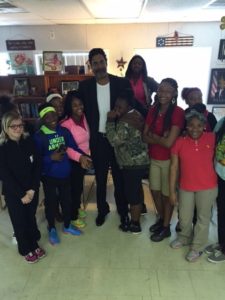
By George Hawthorne, CEO, Diversity Program Advisors, Inc.
Each one, Reach One, Teach One — Building Our Future Leaders CEO, Diversity Program Advisors, Inc.
On March 26th, I was blessed to have the opportunity to speak with some of our young “Leaders” at Bellview Middle School in Pensacola FL. Through the efforts of an outstanding teacher, Ms Dee Wright, these “leaders” from “challenging environments” are learning to “believe that they can achieve” in their lives.
I went to the school to teach these leaders — but, in fact I got a lesson from them!
I was asked to come speak and inspire these young “leaders,” that had few opportunities to be exposed to Black professional people and particularly Black men – and I left inspired by the desire of these 7th graders to learn and achieve.
I asked these “leaders” – “what they wanted to be when they grew up?â€
I was delighted to know that they ALL had aspirations to become doctors, lawyers, actors, actresses, athletes, hairdressers, teachers, architect and other professions. Their enthusiasm, desire and dreams were inspiring to me. However, in talking to these young leaders I quickly learned that they didn’t lack desire to achieve, but, as they said “they had no one in the ‘circle’ that could provide them real life experience in achieving their goals.â€
We then had “real talk” — and what became very apparent to me is the challenges that these future “leaders” face coming from the type of living environments that have historically been “dream-killers.”
What I also learned was, those of us that have escaped economically-challenged communities have a “moral responsibility” to reach out to these young “leaders” and help teachers (like Ms Wright) to expose OUR children to adults that have made it out.
I learned that we must begin to go back to where we all have a responsibility to help provide guidance to these “talented and intelligent future leaders” – The school can be fertile ground for developing relationships that influence students’ educational expectations and postsecondary participation and career opportunities. Mentoring relationships can be developed and shaped in many ways and across numerous opportunities to enhance educational expectations and increase postsecondary participation among all students.
Mentoring exposes at-risk students to areas in which their families and communities may lack knowledge and resources to provide. Caring role models can encourage students to take programs of study and academic courses to prepare them for the challenges of postsecondary education and career attainment.
Community stakeholders can also provide students with the opportunity to participate in extracurricular activities that contribute to their academic and social development. Schools can help students seek out and take advantage of opportunities that facilitate access to postsecondary education, such as learning about and applying for grants and scholarships.
The kids suggested that we create a “support group†to provide them adult role models. The “I Am a Leader Club” was the idea of some aspiring young “leaders” who said they need some assistance from adults who care. This collaboration provides a place where young “leaders” can ask questions that adults can answer and help provide guidance about “LIFE.”
Together, we started a Facebook Page called the “I Am a Leader Club,†where the students are the Officers of the Club and they will get all students to join the Club. I will get some of my friends that are adult professional people to become part of the group and then we can all share ideas advice and opportunities that can help these “leaders” make it happen with their educational goals and career aspirations.
The adult “role-models†will have a responsibility to provide the “leaders” some resources and advice on “how to make it happen.” The “leaders†have the responsibility to look, listen and then DO the things to “make it happen.”
The “I Am a Leader Club†creates a social media “portal†to connect and help disadvantaged and minority students succeed and assists economically disadvantaged students gain academic and
social skills to take advantage of opportunities beyond high school.